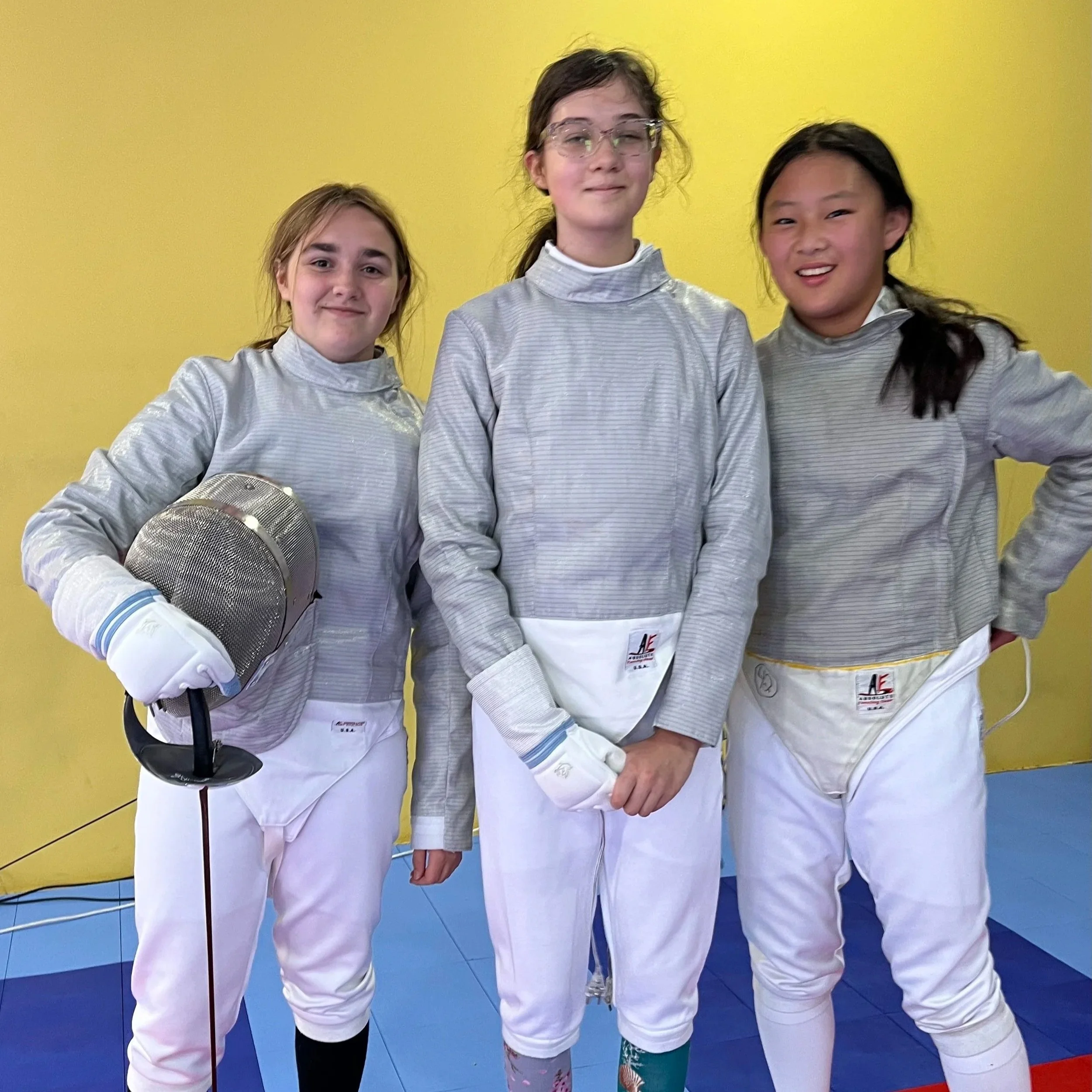From En Garde to Empowerment: How Fencing Benefits Women and Girls
Three Fence St. Louis fencing club girls pose together at the recent Fence St. Louis Season Start Saber tournament.
The sport of fencing has always symbolized agility and intellect. When most people imagine fencing, they picture two masked duelists lunging and parrying in a battle of speed and precision. For centuries, though, that duelist was almost always assumed to be a man. Fencing’s long history is rooted in military training and aristocratic tradition, worlds that largely excluded women and girls.
Women broke into fencing in the early 20th century. They eventually carved out space on the Olympic stage to inspire generations to come. Today, women and girls are not only participating, but are empowered by fencing.
7 Ways Fencing Empowers Women
1. Fencing builds confidence.
Fencing, particularly saber, is unique in its demands for quick thinking. Often, split-second decisions must be made and carried out, as saber fencing rewards both confidence and commitment. This means girls and women learn to trust their instincts and take initiative. There is evidence that sports, like fencing, increase self-esteem.
2. Fencing promotes fitness.
Fencing is a full-body workout. Scientific evidence suggests regular physical activity can decrease risk for serious health conditions for women such as breast cancer and osteoporosis. Some other physical benefits linked to sport participation include better sleep hygiene, increased physical activity, and healthier nutrition.
3. Fencing is inclusive.
Fencing is one of the few sports where practices are nearly always mixed gender and can include a wide range of abilities. Girls and women are often able to compete equally and even outperform larger or stronger opponents because raw power can be punished by technique and strategy.
4. Fencing improves body image.
Girls and women who play sports have higher positive body image than those who don’t. Fencers come in many different shapes and sizes. Short and tall, young and old, thin and thick - every fencer can use their physical attributes to an advantage against others.
5. Fencing encourages mutual respect and sportsmanship.
From saluting your opponent to respecting the referee’s call, etiquette is integral to fencing. Girls learn to compete fiercely but respectfully, valuing both victory and sportsmanship. This fosters emotional maturity as well as grace under pressure.
6. Fencing builds community and belonging.
Fencing clubs often become close-knit, supportive spaces. Women and girls can use the sport to connect, mentor each other, and grow together. Athletes report better peer relationships than non-athletes, and many women find lifelong friendships (and role models) in the fencing community.
7. Fencing opens academic and professional doors.
Teen athletes report better grades, more positive attitudes towards schoolwork, and higher aspirations for college and beyond than non-athlete peers. Fencing is a respected collegiate sport, with scholarship opportunities and a strong presence at universities. In fact, there are more NCAA women’s fencing programs than there are men’s fencing programs. Fencing is also attractive on college applications and résumés for its blend of athleticism and intellect.
Two teenaged female fencers from Fence St. Louis watch a bout on a phone at the Remenyik 2025. Lily fenced Lillian’s upcoming direct elimination opponent in pools, so they are doing reconnaissance.
The Fence St. Louis Difference
Overall, there is a gendered sport participation gap: women and girl’s participation in sport has often lagged behind that of boys and men. More than 38% of U.S. girls – compared to 25% of boys – don’t participate in sports, and 43% of girls drop out of sports after elementary school, where only 24% of boys the same age drop out. There are a variety of factors that girls suggest influence their participation, including lack of female role models.
Here in St. Louis, MO, women and girls have a home for fencing at Fence St. Louis. Fence St. Louis is a women-owned and operated fencing club dedicated to making the sport accessible, inclusive, and empowering. Very few fencing clubs in the United States are women-owned and operated: only 5% of USA Fencing clubs reported a female coach on staff, and less than 23% of fencing coaches are women as recently as July 2023. Fence St. Louis models possibilities for female athletes by having women as coaches and owners.
Join the Movement
Fence St. Louis is more than a fencing club: it’s a place where women and girls are encouraged to challenge themselves and try something new. No matter your level or goals, there’s a place for you here. Be part of a community that celebrates strength, strategy, and sisterhood.
The finalists of Senior Women’s Saber of the Fence St. Louis Season Start Saber tournament.




